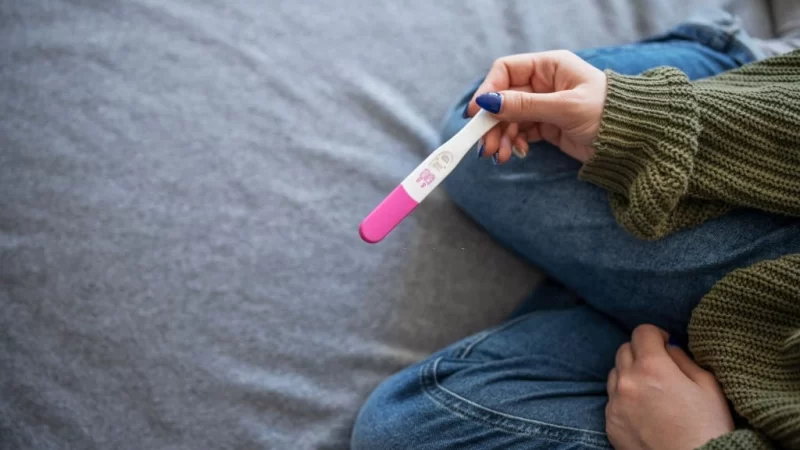When Is The Best Time To Take A Pregnancy Test? 5 Common Signs

When is the best time to take a pregnancy test: The optimal time to take a pregnancy test is one week after a missed period.
Although it takes time for the body to increase its HCG levels, certain tests may detect pregnancy as soon as 1-2 weeks after sexual activity.
Testing before a missed period may increase the risk of erroneously negative findings.
How Do Pregnancy Tests Work?
Even with the most effective birth control methods, mistakes may sometimes happen.
In the end, fertilising an egg only requires one sperm. To find out whether or not that has happened, use an over-the-counter (OTC) pregnancy test.
Human chorionic gonadotropin is often detected in urine by over-the-counter pregnancy tests (HCG).
HCG will only be present during pregnancy. The hormone doesn’t start working until a fertilised egg attaches externally or to your uterine lining.
Many techniques might be used to collect your urine for the test. You may need to Depending on the exam you select:
- Test the liquid in your urine with a tester stick after collecting it in a cup.
- Use an eyedropper to dispense a little amount of urine into the specified container after collecting your urine in a cup.
- Place the testing stick so that it will catch your poop midstream, close to where you expect to pass urine.
According to Cleveland Clinic, most tests have a 99 per cent success rate when given following a missed period.
The best thing is that you can do it by yourself at home. Merely begin the test, follow the instructions, and, when the suggested period of time has elapsed, see the findings.
After the recommended length of time has passed, the tests will reveal your results in one of the following ways:
- Colour change
- A line
- A symbol, such as plus or minus
- Terms such as “pregnant” or “not pregnant”
How Fast Can A Pregnancy Test Be Performed?
Wait until the week after your missed period to take a pregnancy test for the most accurate results.
If you don’t want to wait until you miss your period, you should wait for at least one to two weeks after having intercourse.
If you are pregnant, your body needs time to generate detectable levels of HCG. This typically takes seven to twelve days after an egg has been successfully implanted.
You might have a false-positive result if the test is carried out too early in your cycle.
Here are a few clues that a pregnancy test is necessary.
1. You Didn’t Experience Your Period
One of the first and most reliable signs of pregnancy is a missed period. If you don’t continually check your cycle, it could be difficult to determine whether you’re late. The typical woman has a 28-day menstrual period.
Consider getting tested if it has been more than a month since your last menstruation.
Note that your period may sometimes be skipped or delayed due to stress, dietary restrictions, physical activity, or other medical conditions. If you think you could be pregnant, keep an eye on your flow as well.
During the first few weeks of pregnancy, as the egg implants more into the uterine lining, light bleeding or spotting is usual. Take note of any alterations in the blood’s size, consistency, or colour.
See your doctor if you suffer bleeding and a positive pregnancy test.
2. You’re Experiencing Cramps
Furthermore, cramping similar to those experienced during periods may be brought on by implantation.
Early on in your pregnancy, you could feel this ache and hope that your period will start soon, but it never does.
Sounds familiar to you? Take a test. Hormone levels vary by the woman and by pregnancy.
3. Your Breasts Are Sore
Oestrogen and progesterone, which are generated in increasing levels during pregnancy, start to change your body to aid in the growth of the foetus.
Your breasts may feel more sensitive and seem bigger as a consequence of the increased blood flow. Your nipples could hurt, and the veins in your skin might seem darker.
Due to the fact that many women also have breast discomfort in the days leading up to their period, this symptom isn’t often indicative of pregnancy.
Recommended; How To Crack Your Back By Yourself When Pregnant? 15 Best way
4. You Experience Something Distinct
When you are first pregnant, you could feel like:
- Nausea
- Phobias related to eating
- Exhaustion
- Continuous urination
Throughout the next weeks, these symptoms might become worse until your HCG levels stabilise at the end of the first trimester.
Because you are the authority on yourself, pay attention to your body. If you have any unanticipated physical symptoms, you should think about getting a pregnancy test.
5. You Lost A Pregnancy
Other methods of contraception, such as condoms and birth control tablets, do not totally prevent pregnancy.
In other words, there is always a little chance of becoming pregnant, regardless of how careful you are.
Regardless of your choice of birth control, consider being checked if you experience any of the symptoms we’ve listed.
Human error or defects may also be to blame for unintended pregnancies. It could be difficult to remember to take your birth control pills on a daily basis.
According to Planned Parenthood, if women take the pill as directed, nine out of every 100 will get pregnant.
Condoms may be misused improperly and are prone to ripping and breaking. According to Planned Parenthood, about 18 out of every 100 women who use condoms for contraception get pregnant each year.
If you are worried about contraceptive failure, speak to your doctor about additional contraceptive methods, such as an intrauterine device (IUD).
According to Planned Parenthood, less than one in every 100 women who use an IUD gets pregnant each year.
If In Doubt Test
Sexually active women in their reproductive years have the chance of becoming pregnant every month, even while using protection.
If your body gives you particular signals, you may think about getting a pregnancy test. For optimum results, take the test as soon as you believe your period has skipped it.
Hold the test for many hours or do it at your first bathroom visit of the day to increase the concentration of the HCG hormone that the test detects.
Early testing guarantees that you get the proper care for yourself and, if required, that your unborn child receives prenatal care.
If the test is positive, speak with your doctor straight away to discuss your options and likely next steps.














